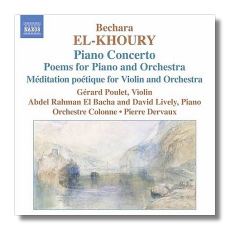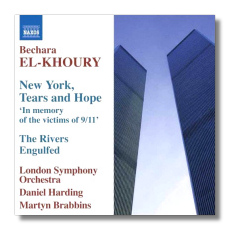
The Internet's Premier Classical Music Source
Related Links
- Latest Reviews
- More Reviews
-
By Composer
-
Collections
DVD & Blu-ray
Books
Concert Reviews
Articles/Interviews
Software
Audio
Search Amazon
Recommended Links
Site News
 CD Review
CD Review
Bechara El-Khoury

Orchestral Works
- Méditation poétique for Violin & Orchestra, Op. 41
- Piano Concerto, Op. 36 *
- Poème #1 for Piano & Orchestra, Op. 11
- Poème #2 for Piano & Orchestra, Op. 22
- Sérénade #1 "Autumn Leaves" for String Orchestra, Op. 10,
- Sérénade #2 for String Orchestra, Op. 20
Gérard Poulet, violin
* Abdel Rahman El Bacha, piano
David Lively, piano
Orchestre Colonne/Pierre Dervaux
Naxos 8.557692 DDD 66:00


- New York, Tears and Hope, Op. 65
- Les Fleuves engloutis (The Rivers Engulfed), Op. 64 *
- Violin Sextet, Op. 58
- Waves, Op. 60 **
- Forgotten Fragments, Op. 66 ***
* Daniel Harding, piano
** Hidéki Nagano, piano
*** Dimitri Vassilakis, piano
London Symphony Orchestra/Martyn Brabbins
Naxos 8.570134 DDD 52:10
Bechara El-Khoury (b. 1957, and therefore not to be confused with the former President of Lebanon!) began his musical education in Beirut and continued it in Paris, starting in 1979, where he eventually settled. Several of his works originally appeared on the Forlane label. In fact, the performances on the first of the two discs reviewed here first appeared on Forlane. Naxos has two additional discs by El-Khoury in its catalog, one of them also compiling recordings originally released by Forlane.
I wish I could be more positive about these discs, but I was somewhat disappointed by them. Gérald Hugon, in his booklet notes to the first disc, claims that El-Khoury's compositions "form part of a current of contemporary music that ranges from Allan Pettersson's symphonies and Górecki's Third Symphony to the latest works by Penderecki, Rautavaara, and Kancheli: music which is inextricably linked to the expression of human feelings, be they individual or collective." Would that it were truly so! These are composers I respect, and I can see how El-Khoury's music is part of that same "current," but at this point in time I don't hear what makes it distinctive. Apparently, El-Khoury's earlier works (before 1979) were more closely influenced by the music of his Lebanese homeland. The earliest works on this pair of CDs are the first Poème for piano and orchestra, and the first Sérénade for string orchestra. In a blindfold test, I definitely would have guessed these to be the works of a French composer – and not, I am afraid, the most innovative one. Apart from that, there's a little bit of this and a little bit of that in this music – from Rachmaninoff to American film scores from the 1950s, and plenty in between. It's tonal, well constructed, and overall, not difficult on the ears. Unfortunately, it just doesn't excite me. If your reaction is different than mine, then more power to you.
The second disc contains New York, Tears and Hope – yet another work inspired by the collapse of the World Trade Center. (The subtitle is, "In memory of the victims of 9/11.") The musical memorials to those who died on 9/11 have been curiously ineffective thus far – the best I've heard is Robert Sirota's Triptych – and El-Khoury's work further suggests that more time needs to elapse before composers achieve the right distancing to make this difficult subject succeed as a piece of music.
The first disc – the one conducted by veteran Pierre Dervaux – was recorded live in the 1980s. The engineering is fine, but frankly, some of the orchestral playing is pretty rough. The second disc is newly recorded and also sounds fine, but it too contains more than its share of below par playing. Perhaps there's more to El-Khoury's music than I am gleaning here, but these performances are not revealing it to me.
Copyright © 2007, Raymond Tuttle




















